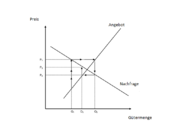- Cobweb
-
Das Spinnwebtheorem (eigentlich Spinnenwebe-Theorem, engl.: cobweb theorem) stellt einen Erklärungsansatz für den um den Gleichgewichtspreis oszillierenden Marktpreis auf den Gütermärkten dar. Der Marktpreis oszilliert hierbei um den Gleichgewichtspreis mit entweder zunehmender, konstanter oder abnehmender Amplitude.
Der Grund dafür liegt im verzögerten Handeln der Anbieter. Diese orientieren sich bei der Planung ihres Angebots – faktisch der Produktionsmengenplanung – an den Preisen der Vorperiode. Dagegen ist die Nachfrage vom Preis der aktuellen Periode abhängig. Je nach Ausgangssituation kommt es dabei zu Angebotsüberhängen, die einen Preisrückgang zur Folge haben. Die Reaktion der Anbieter darauf ist eine Reduktion des Angebots, was in der Folgeperiode wieder zu steigenden Preisen führt.
Solange der Preis vollständig vom aktuellen Angebot bestimmt wird und das Angebot vollständig durch den Preis der vorangegangenen Periode, setzt sich das Muster der Schwankung von Preis und Produktion unbestimmt lange fort, ohne dass ein Gleichgewicht erreicht wird.
Das Spinnwebtheorem wurde als theoretische Erklärung für den sogenannten Schweinezyklus diskutiert. Durch das Einpendeln von Angebot und Nachfrage bildet sich graphisch im Idealfall eine spinnennetzartige Spirale, daher der Name.
Literatur
- Ezekiel, M., The cobweb theorem, in: The quarterly journal of economics, Band 52, S. 255-280, Cambridge 1937/38
Wikimedia Foundation.

